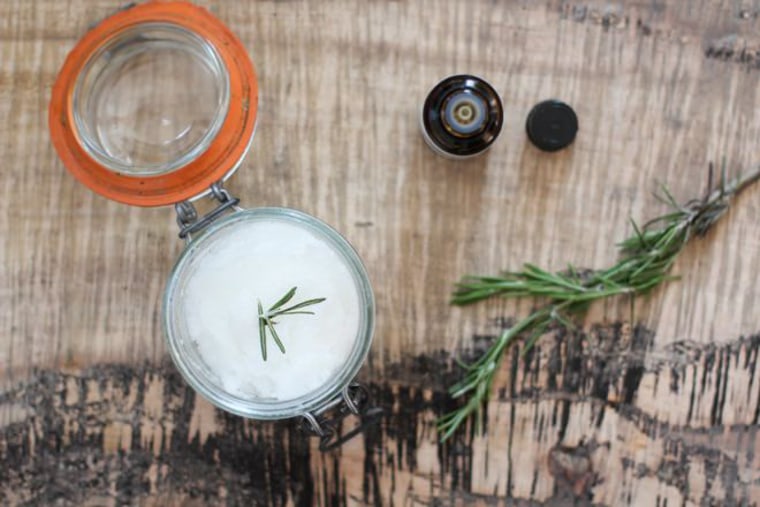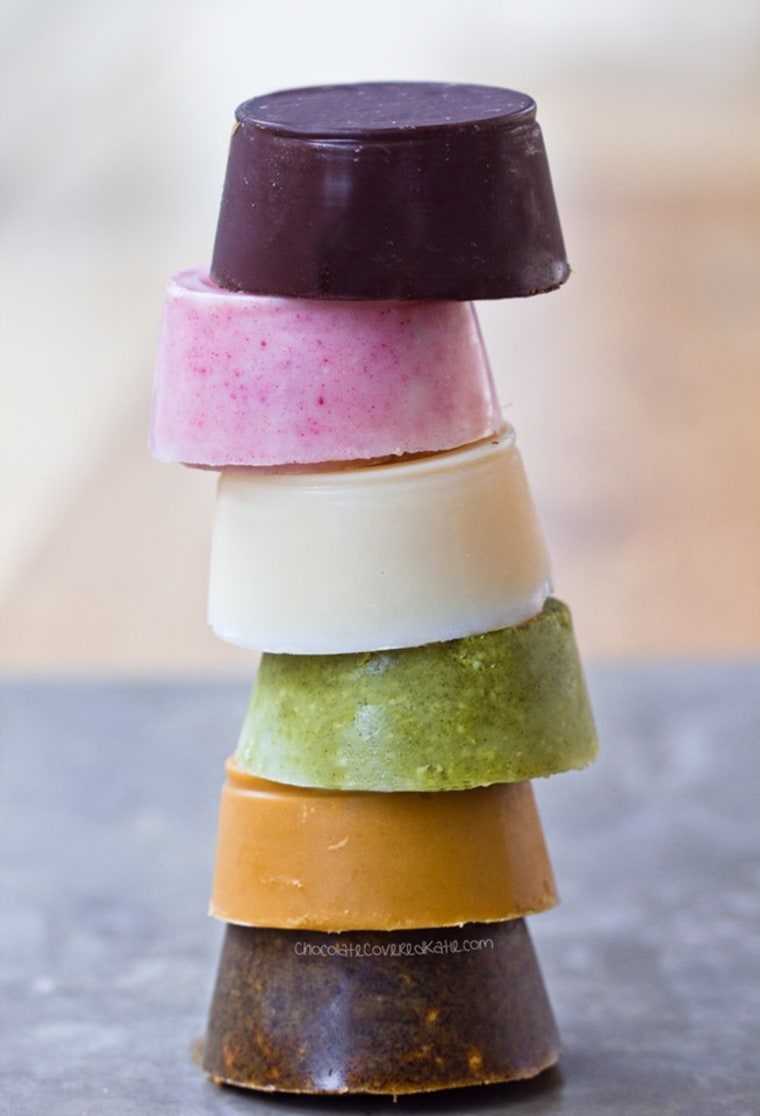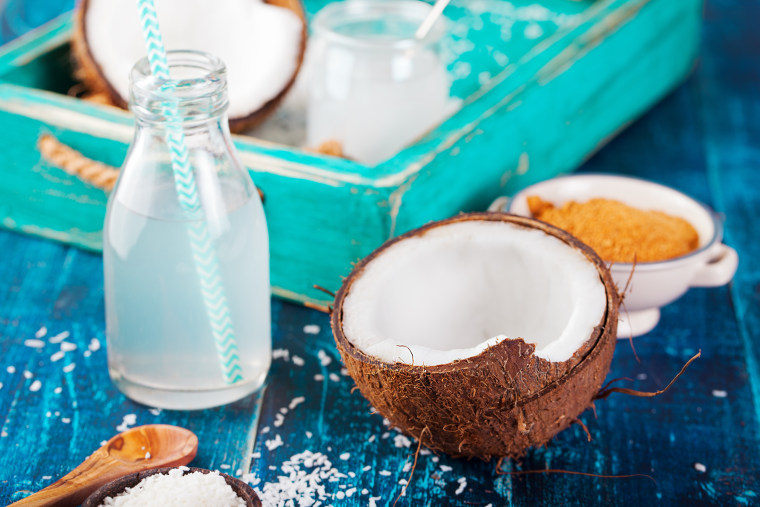Trendy foods come and go, but coconut oil, well, it’s stuck around. Now that everyone’s obsessed with tossing it in their stir fries, adding it to baked goods, stirring a dollop into their coffee, and slapping it on their hair and skin, we have to ask: does it really live up to all the hype?
“Like any other whole food, coconut oil is not a magic food where you can incorporate it into your lifestyle and radically transform your health,” says McKel Hill, MS, RD, founder and author of Nutrition Stripped.
The oil was vilified for so long because of its saturated fat content. Although both coconut oil and its healthy competitor olive oil contain about the same amount of total fat (13 grams per tablespoon), the fat makeup of the oils is very different. One tablespoon of coconut oil contains 11 grams of saturated fat, versus just two grams in olive oil. It fact, over 90 percent of the fat in coconut oil is saturated.
And that matters.
Why? Olive oil is made up of monounsaturated fatty acids, which have been found to protect brain and heart health. The American Heart Association recommends that the majority of fats you eat should come from monounsaturated fats (like olive oil) or polyunsaturated fats (like fatty fish such as salmon or walnuts). Their guidelines on fat intake haven’t changed: the average person eating 2,000 calories a day should stick to no more than 13 grams of saturated fat a day, says the AHA. If coconut oil is part of that, you have to be very careful about the amount you’re eating (since just one tablespoon almost maxes out your daily quota), says Penny Kris-Etherton, PhD, RD, distinguished professor of nutrition at PennState.
Plus, there are special concerns to take into account for those with certain health conditions. “Coconut oil is rich in saturated fats, which are linked to elevated LDL cholesterol levels and possibly make insulin resistance worse, a problem for millions of people with type 2 diabetes and prediabetes,” says Virginia-based Jill Weisenberger, MS, RDN, author of The Overworked Person’s Guide to Better Nutrition.
In fact, a recent study in the Journal of the American College of Cardiology tackled “nutrition controversies,” one being coconut oil. After reviewing the research, the authors recommend avoiding coconut oil because of the effect that the high saturated fat content can have on your heart. “Saturated fat increases LDL cholesterol, a risk factor for heart disease,” says Kris-Etherton, who co-authored the study.

That said, obviously not everyone shies away from coconut oil. Many health experts welcome it into their pantries, swearing by the ingredient for its beauty and health benefits. And there is some preliminary research supporting the benefits of ingesting coconut oil, such as weight loss, boosting metabolism, and anti-bacterial properties. Many studies also show no significant evidence that saturated fat is linked with an increased risk of heart disease, and a recent study confirmed that in the context of a healthy, unprocessed diet, saturated fat intake doesn’t increase heart disease risk.
Some proponents also claim that the saturated fats found in coconut oil, like lauric acid, are an exception to the rule, since they’re made up of a good proportion of medium-chain triglycerides (MCTs), which are absorbed more quickly by the body. However, a study published in the journal Nutrition Reviews suggests that’s not actually the case. Kris-Etherton points out that some people now believe lauric acid may actually behave like a long-chain fatty acid (not a medium-chain one) and therefore potentially raise your “bad” LDL cholesterol. So in the context of a typical Western diet (heavy on processed and fast food), coconut oil is uniquely unhealthy, the study suggests.
The truth is, there just isn’t a lot of hard evidence to warrant the health halo that coconut oil has been crowned with. The general guidelines from health organizations haven’t changed in regards to saturated fat, and much of the support behind the “superfood” status of coconut oil is anecdotal, lacking concrete scientific evidence. So it’s best to err on the side of caution when incorporating it into your diet. Follow these rules when experimenting with the ingredient:
Oil Smarts: 4 Rules to Follow
- Stick to liquid oils for everyday cooking. Weisenberger recommends using liquid oils like olive oil for everyday cooking, like sautéing and stir-frying, because it has a breadth of research behind it as a health-promoting food. “Research shows unsaturated fats are better, no matter what. That’s the bottom-line message,” adds Kris-Etherton. Since we tend to use more than one tablespoon when using these cooking techniques, defaulting to olive oil will help ensure you keep your saturated fat intake at a healthy level.
- Practice moderation. There’s no coconut oil prescription across the board, says Hill. It all depends on you and your unique health goals. Just remember that one tablespoon contains about 120 calories (the same as any other oil), and those calories count. (Meaning a free-for-all with the coconut oil isn’t the way to go, for anyone.) Incorporating it into your diet amongst other healthy fats, like olive oil, avocado, and whole eggs, is a smart move, says Hill.

- Experiment with desserts. Reserving coconut oil for your sweet recipes may be a smart move, since they are already items you consider a treat and in turn, eat in moderation. In baking, you can use it to replace other oils at a 1:1 ratio. And desserts are where coconut oil really shines: “Coconut oil is great to use in raw desserts since it hardens at room temperature and when chilled, making it a great binder,” says Hill. In her kitchen, she whips up a raw avocado lime tart, a cross between cheesecake and key lime pie featuring avocados and lime, as well as maple syrup and coconut oil. You can also use it to make a sugar-free homemade fudge, like blogger and cookbook author Chocolate Covered Katie does, blending together just three ingredients to create a dessert without added sugar.
- Make it a beauty go-to. Pinterest and Instagram are chock full of coconut oil beauty hacks. You should be, too. “I use it daily to moisturize my skin or do a hair mask,” says Hill. She DIYs an at-home hair mask with a combo of coconut oil and lavender and rosemary essential oils. As for hair, it’s a great conditioner. Research indicates that coconut oil’s lauric acid effectively seeps into strands and strengthens hair fiber to guard against damage. When it comes to your skin, Hill points to research showing that the oil can help improve hydration for that ultra-silky texture.
The verdict is in: use a bit of coconut oil in your diet — and cover your body with the rest of it.
